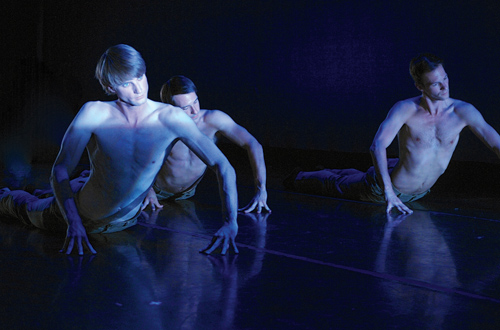Reviewed by Josh Bell ’02
In Test, by Chris Mason Johnson ’95, AIDS is an ever-looming threat, but it’s not the protagonist’s only worry.
[Film] The title of Test, written and directed by Chris Mason Johnson ’95, refers to the first-ever blood test developed to detect HIV, but it also applies to most of what protagonist Frankie (Scott Marlowe) goes through over the course of the movie, which is set in San Francisco in 1985. Although AIDS is an ever-present specter in the film and in the lives of its young gay male characters, Test is not a dour message movie or a heavy-handed melodrama. Frankie worries about AIDS, but he worries just as much about his position in the troupe he dances for and whether he’s good enough to perform in its latest show.
One of Test’s greatest pleasures is its dance sequences, choreographed by Sidra Bell, with additional choreography by Johnson. At one point Frankie half-jokes to his friend and fellow dancer Todd (Matthew Risch) that the piece they’re performing is secretly about anonymous gay sex, but what’s impressive about Bell and Johnson’s work is that it fits within the movie’s narrative about gay life without being overly symbolic or obvious. It’s just beautiful, graceful dancing, ably performed by the cast, and these interludes make Test feel almost like a grungy, low-key musical.

The dance sequences are one of the great pleasures of the film.
Test is also an effective character study of Frankie, who, while not as boisterous as Todd—or as open about his sexuality—has an abiding passion for dance. Johnson doesn’t overload on ’80s signifiers, but Frankie is never without his cassette Walkman, which provides a lovely soundtrack as he walks around the city, absorbed in his thoughts.
Those thoughts return periodically to AIDS, although the disease’s name is almost never spoken, and when it is, it’s usually in background news footage. Frankie gets the actual test of the title nearly an hour into the movie, and even then, Johnson does not keep his audience in suspense for long about the result. Frankie’s story is not about coping with AIDS; it’s about a transitional period in gay culture that coincides with the spread of the disease and the development of a reliable way to detect it. The movie’s final line reframes the title in a personal and positive way, signaling a potential change in Frankie’s life and in the overall perception of gay relationships.
Johnson—a visiting lecturer at Amherst—portrays those relationships as fluid but genuine, blurring the lines between friendship and romance in a way that’s probably recognizable to any current or former 20-something, gay or straight.
AIDS affects those relationships in small but significant ways, whether it’s Frankie and Todd laughing over the “antiquated” use of condoms, or a former lover revealing his own status on an answering-machine message. The virus infuses interactions with people outside the gay community as well, subtly but clearly, as a female dancer balks at touching a sweaty Todd, or a cabbie casually refers to gays as “human garbage.” Johnson treats these encounters as part of Frankie’s everyday life, creating a heartfelt, lived-in tapestry that reaches far beyond the simple, declarative event of the movie’s title.
Josh Bell ’02 is Las Vegas Weekly’s film editor.